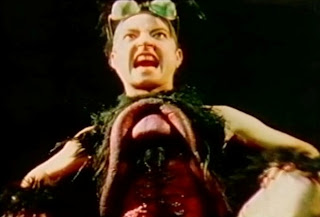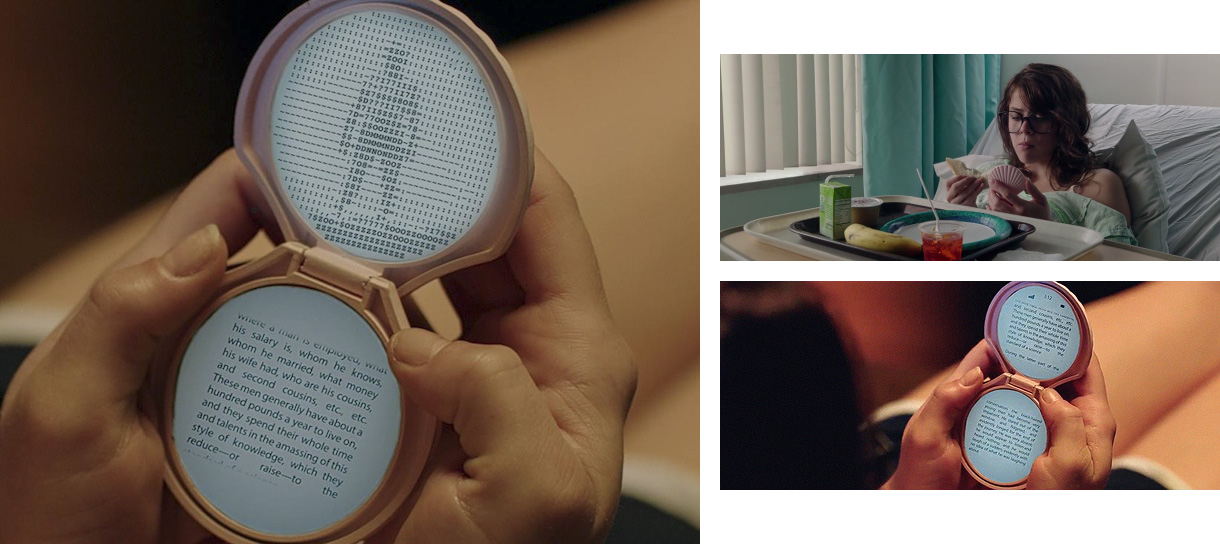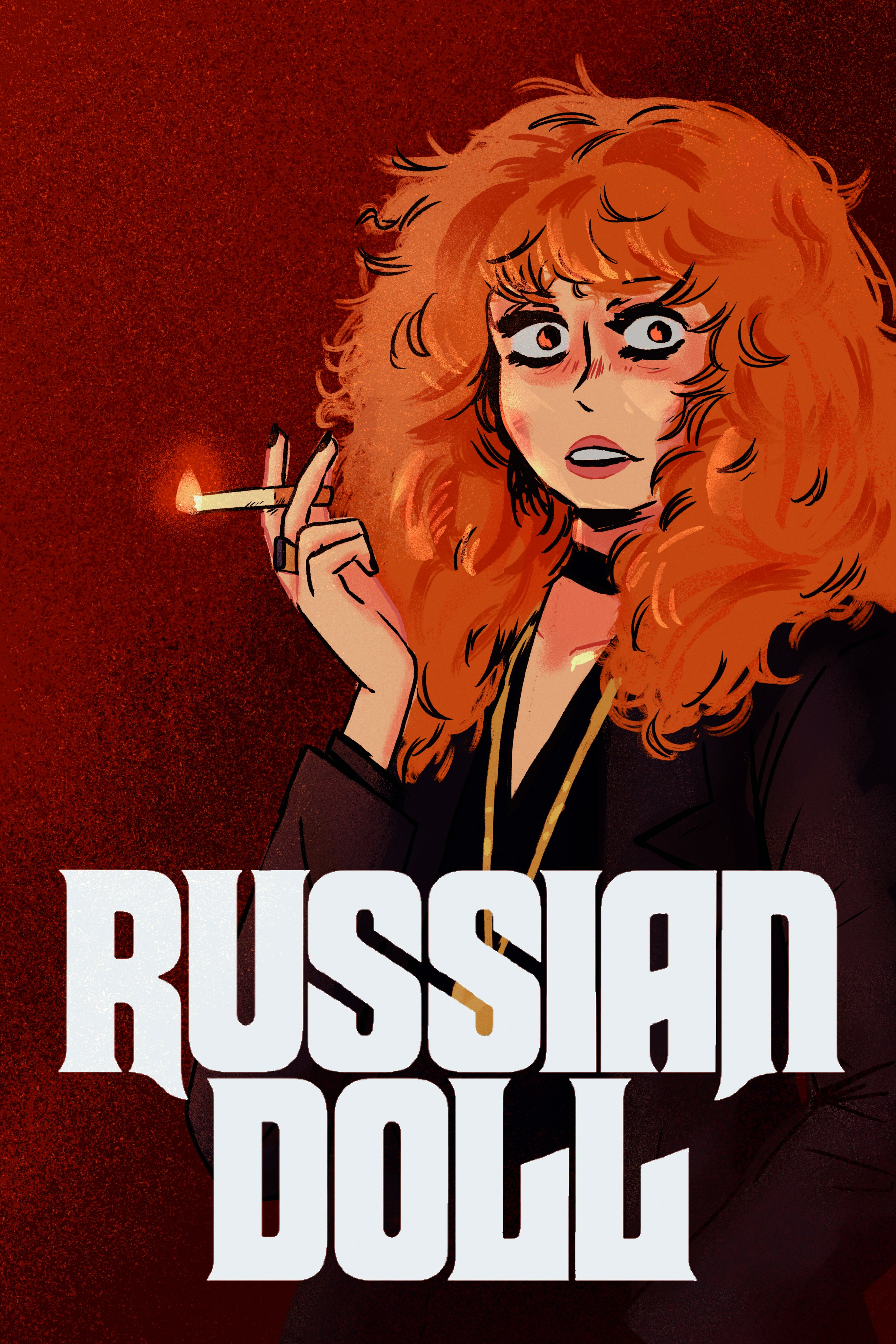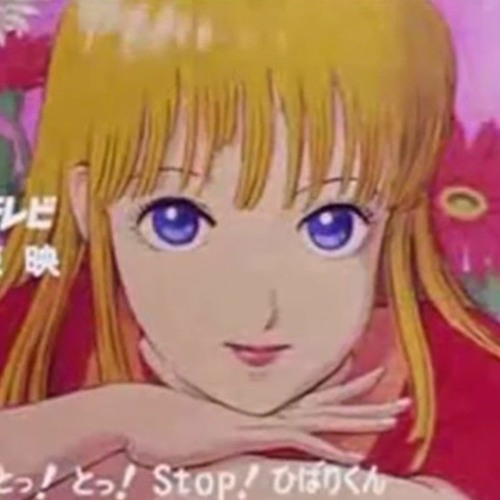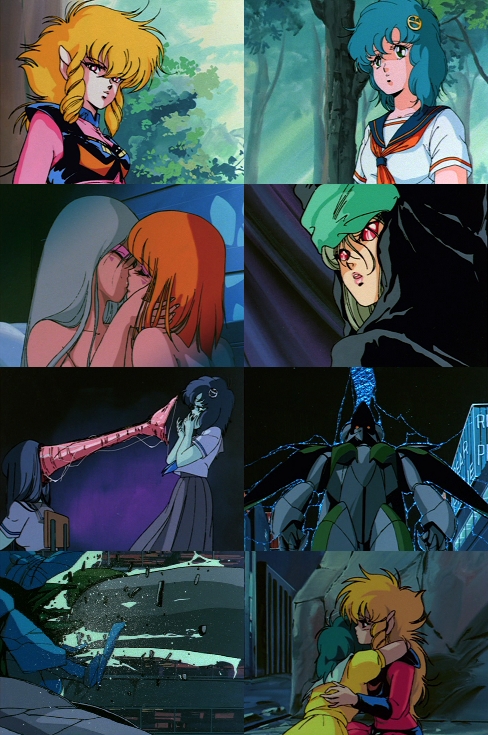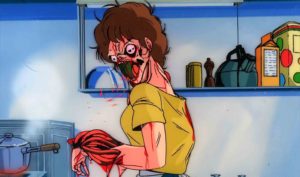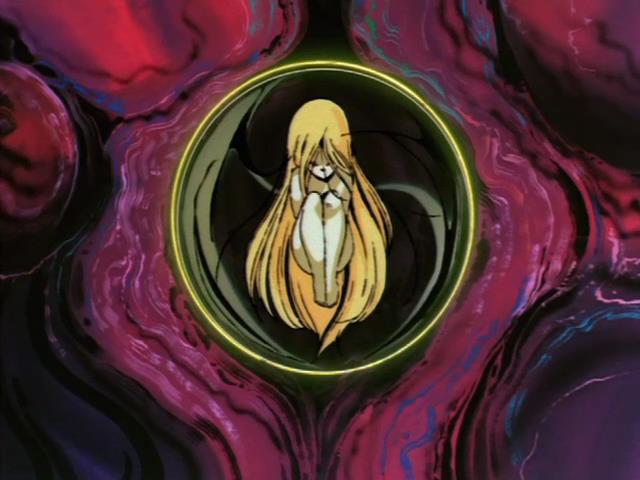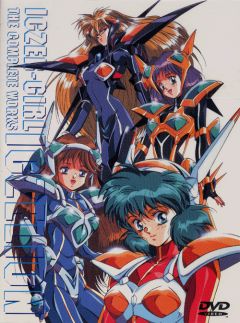Before I get into it, here's another index of the MRD PR posts:
MRD Play Report Index
MRD Module / GM Notes
Not-Review Sessions 1-2 / Doctor Loves-Me-Not's Halloween Party
Even though the posts themselves are organized differently, the first two sessions correspond to the same "module", so I'll describe them this way.
Doctor Loves-Me-Not's Halloween Party was basically a murder mystery inspired loosely by the party scene at the beginning of the Russian Doll series on Netflix and Rocky Horror Picture Show, along with other stuff.
I was really happy with the overall scenario design and I think it had some of the modular Social Intrigue stuff which informed the Module in the book, but I definitely did not yet have this Design Pattern fully realized when I wrote this "module" and it shows. I included some sidebars in the Doctor Loves-Me-Not's Halloween Party GM Notes linked at the top, and I stand by those comments and would encourage you to give them a look if you're interested.
The second session ended in the equivalent of a TPK, but The Team was able to use their Reincarnation Rituals, so it worked out basically as intended. As is often the case with a new game, several of the players came and went between the first couple of sessions, but it was as of Session 3 that The Team as it has existed for nearly a year now has been pretty stable.
Unfortunately, because session 3 was effectively a new group, there were leads that developed in these first two sessions that are only just now getting re-integrated. In fact, there were I think 1-3 sessions (would have to double-check) even before these play reports with an entirely different group, which also set up leads that didn't come back until later (that group was in person and fell apart for covid and related logistical reasons).
Tl;Dr While flawed in some ways, these first two sessions / first "module" is a very good demonstration of what MRD is about, and I could easily imagine myself cleaning it up and turning it into something more like the Module in the book and being really happy with it!
Not-Review Sessions 3-6 / "They Did a Mario Kart"
Technically a fair bit happened in these sessions, but it wouldn't quite be accurate to call them a cohesive "module" in the way I referred to the Halloween Party in the last two sessions. However, it does encompass one "story arc" so I'll wrap them together.
While I posted the PRs as 3-5, in retrospect session 6 was when this "arc" wrapped up, but I guess that wasn't obvious until after the fact.
Session 3 was a fresh start with a new Poltergeist Investigation and in effect a new Team. In retrospect the way I designed it was terrible, but I think to the Players' credit we had a good time.
I basically gave them two or so options for Investigations, but they were both nearly identical- being only just different enough to require that my GM Notes accounted for each of them differently. From a software engineering perspective, we call this an Anti-Pattern, and it is something I have since tried to be better about not doing, and I'd like to believe mostly successfully.
It was a fun little adventure, and it set up some future NPCs and future plotlines. The players really liked Shining Ostrich which made me happy.
Session 4 was the "Mario Kart" part, where they went to The Court of Those Who Bet on the Wrong Horse. I was much happier with how I designed the scenario, although the "Mario Kart" part of it, while fun, probably could have been better fleshed out. It's not about going crunch-crazy, but I played it pretty fast and loose even by my standards and while it worked for me, as the writer, if I were to ever try to publish it, I would need to heavily rework it for those who cannot read my mind.
You can see the GM Notes for Off to the (Karmamare) Racetracks linked at the top, which actually includes the GM Notes for session 3 as well. If you do read it, you'll see the anti-pattern I was referring to, but for the actual Karmamare part, you can see how there was still some structure to it, but probably needed a little more structure.
Session 5 Was a bit of a sidetrack, admittedly of my own making. It definitely did set stuff up for the future such as by introducing or further developing certain NPCs, but in itself was more of a "filler episode" lol, not too much more to say about that.
Session 6 was the culmination of events from the prior sessions. To my mind, it was the most successful of the first six sessions in terms of the number of fun things I gave the players to interact with in the scenario and the degree to which they were developed. The actual scenario around sessions 1-2 may be more so to my tastes, but from a game perspective, I think this is where things started to gel.
There was also a really poignant moment at the end of session 6, within an otherwise rather absurdist scene, and at the very least I appreciated it, but I hope my players did as well.
I apparently never posted the GM Notes for the scenario in session 6, which is a shame because I think it was pretty good. Not sure why I didn't do it, maybe I need to do so retroactively, or maybe there was a reason why I did not...
Not-Review Sessions 7-11 / The Hostile Takeover of Anti-Sphinx
These sessions were a turning point for the campaign, and also where a lot of my thoughts about the setting and my approach to design started to coalesce. This was probably also facilitated by the fact that I was designing the book around this time.
Again, even though I posted them as 6-11, in retrospect, 6 should have been in the previous post and this post should have started with 7.
Prior to these sessions, the game had been set up in a more episodic approach to Poltergeist Investigation -> Court Crawl, and this batch starts that way but ends things in a way that completely changes the paradigm which I found very exciting, although I was admittedly uncomfortable with it at first (see the Session 10-11 not-review below).
Session 7-8 Got real weird and experimental, in a way that I loved but my players were a bit more mixed on at the time, although I believe have since come to appreciate. This was part of what I refer to in my post on Tabletop RPGs as Performance Art and must have been around the time those ideas were growing fully formed in my mind.
I did not at the time have as strong of an idea of where I was going as I should have, and I also in retrospect did not do a good enough job giving the players a good idea of what they could or should do. I can't help but look back on it fondly, but it was certainly flawed.
Partway through session 8 The Team developed a more concrete plan and executed it, and it gave the players an opportunity to flex a bit which worked out well. It was basically a heist, and I don't give this session enough mindshare but in retrospect, it was actually a really fun and well-executed heist that was mostly player-driven, couldn't ask for more from it. The session ends with them coming back to where they were in session 7, culminating in a cliffhanger of a big Conflict that was about to come.
Session 9 is the aforementioned Conflict. The Conflict was swift and brutal as any Into the Odd-adjacent game should be, with Fiona using her Reincarnation Ritual in order to help the other PCs escape what were otherwise seemingly insurmountable odds. The rest of the session was also pretty rapid-fire with some big reveals. I did some stuff that is either clever or deceitful depending on your perspective that paid off nearer to the end of this "arc", which I was happy with but which I know one of the players struggled with at first, and which amounted to something ultimately not within my original plans but ended up being significantly better anyway, as I discuss below.
Session 10-11 also were pretty rapid-fire, with The Team running a coup against The Underground Casino which had been plaguing them in the background for some time, only to learn that the Underground Casino was not quite what they thought it was.
I won't lie, I struggled a lot with these sessions. On the one hand, I had repeatedly signaled to the players that they needed to do more investigation, that there were important details they had not uncovered and that they were getting themselves in over their head, and they had been burned on things like that in the past, but they chose to commit to their course of action regardless.
I think, especially from an "OSR perspective", it would have been well within my "right" to be punitive about it and basically punish them in exactly the way one would expect if they knew those things that they had been encouraged to investigate. However, I really didn't feel good about doing that, and I wanted to find a better solution.
Ultimately, I gave them what they wanted, a successful coup of this organization, but I framed it within the context of a Parable, or just as well a Fable- it was ok that they did something implausible, because the Parable becomes something of greater metaphysical weight, greater than the material act of what they'd done. You could almost think of it like "The Law of Surprises", the metaphysical phenomenon that may or may not have real power within the setting of The Witcher and which ends up driving the narrative (as opposed to the short stories it started in).
On The Cauldron, we were discussing Jewish Fables, and I was raised Jewish, and I actually was in a very roundabout way inspired by Jewish fables with this session myself. I remembered this article that I had read around ten years ago, and recently rediscovered and reread and am glad to say it holds up to my memory. The writer discusses the scene in Coming to America, the Eddie Murphy movie of all things, where Eddie Murphy plays an old Jewish guy. You can read my explanation, or watch the clip on youtube.
Or embedded here (but embedded videos on blogger have not always been reliable for me...):
The old Jewish guy tells a story about going to a restaurant and ordering a soup, and the waiter brings the soup, and he asks the waiter to taste the soup, and the waiter refuses. He asks repeatedly, the waiter uncomfortably repeatedly denies, but when the old man does not relent, finally he does. Looking down at the soup and at the table, he then says "there's no spoon", to which the old Jewish guy says, "achaa!". I really like that anecdote.
So that was also part of what inspired this turn of events. Even though this game is nominally about Buddhism and the interplay between Buddhism, Taoism, Confucianism, and Chinese Mythology (really as just a metaphor or lens for modern issues), I try where possible to use my own lived experience as a person of Jewish descent or as an American or whatever to inform the game and setting, because my experience is not that of a Buddhist or Taoist in China circa the 16th Century when Journey to the West was written.
Anyway, so as a result, the game stops being about a ragtag group of Poltergeist Investigators, and instead is about a ragtag group of Poltergeist Investigators who overthrew a multi-national crime syndicate/information network/anti-fascist group that is now in a critically compromised state, in part due to their own actions, but also these factors were partially responsible for their success in the first place; capitalizing on Anti-Sphinx's moment of weakness without even realizing it.
Not-Review Sessions 12-16
Despite failing to come up with a name for this "arc", this was the first PR post that actually does reflect the arc as I see it- progress is being made lol. In all seriousness though, I do think this "arc" is where I really hit my stride, I would say I even "leveled up" as a designer. This is as much due to me designing the book at the same time and having to really think critically about how I do things, but all the same, this was awesome. Also by this point, the players have developed a good grasp of their characters and the setting and me as a GM, so they've been empowered to do more, and they've made some really clever and interesting decisions that have informed these sessions greatly.
Session 12 Is where The Team learns exactly how bad the situation with Anti-Sphinx is, but also meets the various agents within the organization and comes up with plans for how to fix things. I was worried at first again about possibly being too punitive, but it helped me to think of it within the context of the Parable, to treat this not as a punishment, not the end of the previous arc, but instead as the beginning of a new one, and that helped greatly.
I literally created a whole set of spreadsheets that are basically pivot tables, in order to map out the Social Intrigue / Domain-play scenario of it all; probably should have just made an actual SQL / relational database for it, but it's been working fine.
Session 13-14 was a bit of a diversion and got very goofy. It also involved me leveraging materials produced for The Module from the book but running it in a totally different context, which was fun to do. It also set up Emil McGinnley / Glass Maiden Pixie, which did move the "plot" forward for this "arc", and actually the "Excuse-Me-Sir!" Karmic malware also sets up the subsequent "arc" which is still ongoing and which I have not posted about yet.
Session 15-16 was a ton of fun. I didn't make a separate GM Notes post but I included the pertinent details in this PR. In terms of an "Action Conflict" this was hands down my favorite yet. It felt very video-gamey but in the best way. I would love to expand on this and turn it into something publishable. It wouldn't be worthwhile to reiterate it here but I would strongly encourage you to go back and read it if you have not already done so and are otherwise finding the rest of this interesting.
Final Comments
So wrapping it all up, I'm extremely happy with how this setting has developed, and this campaign, and this group. I've gotten to know my players well and feel lucky to have such a great group. It's encouraging to feel like the campaign is only getting better and that both my actual skills as a designer and my conscious understanding of design have both notably been improving, and it's also fascinating the ways that growth has been driven at least in part by having written the book. It goes to show the non-linear gains one can make by trying to do things in a more comprehensive, systematic way. Even though we're only a couple sessions into the current arc, the most recent session as of this posting was one of my favorites yet, a very emotional scene, my players probably know what I'm talking about if they're reading this. I genuinely believe that there are things that have occurred in this campaign that I will carry with me for a significant amount of time if not the rest of my life.

